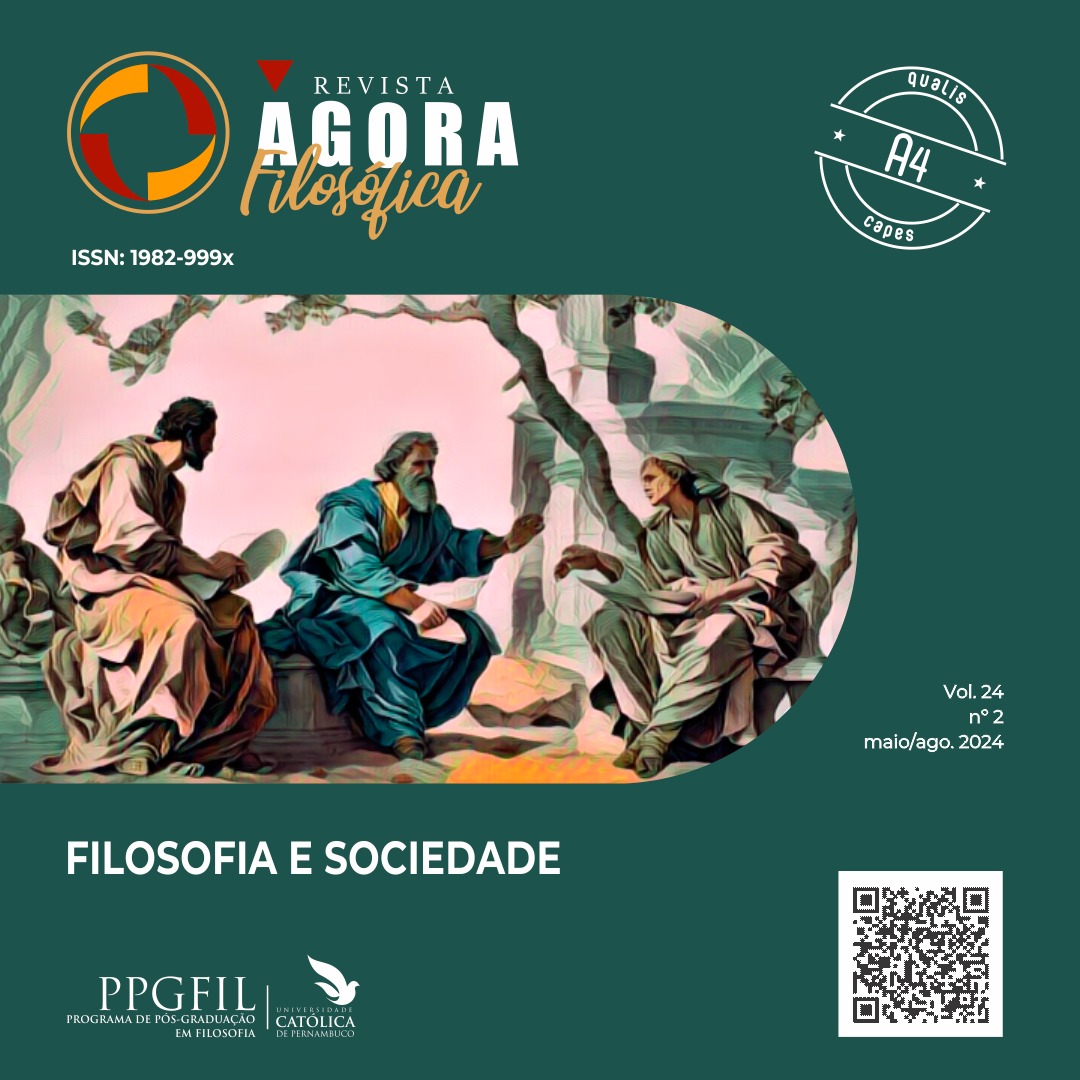The ecological crisis and safeguarding living conditions: ethical demands and premises for a new humanism
DOI:
https://doi.org/10.25247/P1982-999X.2024.v24n2.p61-89Keywords:
man, globalisation, Africa, ethics, ecologyAbstract
The interdependence and fundamental equality of all people in terms of dignity and rights leads us to postulate more humane and just living conditions, as well as to reflect on what haunts it, such as the prevailing liberalist and utilitarian tendencies and ecological imbalances. There has been greater sensitivity towards the environment and ethical proposals have been adopted to deal with this emergency, but the trend has not yet been reversed or changed. Nature continues to be treated as a res nullius and the effects of this trend are increasingly jeopardising the environment. It is therefore urgent to reflect on the crisis threatening the planet and re-establish the conditions for the survival of our "common home". Such a proposed solution may be possible with an ethical stance, i.e. by realising that every living being needs the vital conditions of a healthy environment. Ethical reflection as a proposed solution to the ecological crisis is justified by the fact that the context of interdependence between organisms and the habitat in which they find themselves, imposes rules that create a sense of belonging from which obligations and duties derive, and creates the awareness that what contributes to the preservation, integrity, stability, beauty and balance of the planet is just and good
Downloads
References
AA.VV. África no mundo contemporâneo: estruturas e relações.
Rio de Janeiro: Garamond, 2014.
AA.VV. La questione ecológica. Roma: Editrice Ave, 1989.
AA.VV. O desenvolvimento do continente africano na era da mundialização. Coimbra Almedina, 2005.
ABBAGNANO, Nicola. Storia della filosofia I. Torino: UTET, 1963.
ALPHANDÉRY, Pierre, et alii. O equilíbrio ecológico. Lisboa: Instituto Piaget, 1993.
BERGER, André. O futuro dos climas. In: BARRÈRE, Martine. Terra património comuI. Lisboa: Instituto Piaget, 1993.
BURGIS, Tom. A pilhagem de África. Amadora: Vogais, 20163.
CARBONE, Giovanni. L’Africa. Gli stati, la politica, i confliti. Bologna: IlMulino, 20123.
CONFERÊNCIA EPISCOPAL POSTUGUESA. Nota pastoral sobre a preservação do meio ambiente. In: Celebração litúrgica, 4 (1987-1988) 1284-1285.
DAHRENDORF, Ralf. Quadrare il cerchio. Bari: Laterza, 1996.
DA ROCHA, Manuel José Alves. As transformações económicas estruturais na África Subsariana 2000-2010. Luanda: Mayamba, 2013.
DROUIN, Jean-Marc. Reinventar a natureza: a ecologia e a sua história.
Instituto Piaget, Lisboa 1993.
FALK, Richard. Globalização predatória: uma crítica. Lisboa: Instituto Piaget, 2001.
GAFO, Javier. Bioética. Lisboa: Paulus, 20183.
GATTI, Guido. Questioni di etica dell’economia. Roma: LAS, 1997.
GOLDSMITH, Edouard. Desafio ecológico. Lisboa: Instituto Piaget, 1995.
IGREJA CATÓLICA. Papa (1978-2005: João Paulo II). Carta Encíclica: Redemptor Hominis. Libreria Editrice Vaticana, Vaticano 1979.
IGREJA CATÓLICA. Papa (1978-2005: João Paulo II). Carta Encíclica: Centesimus Annus. Libreria Editrice Vaticana, Vaticano, 1991.
IGREJA CATÓLICA. Papa (2005-2013: Bento XVI). Carta Encíclica: Caritas in Veritate. Libreria Editrice Vaticana, Vaticano, 2009.
IGREJA CATÓLICA. Papa (2013: Francisco). Carta Encíclica: Laudato Si. Libreria Editrice Vaticana, Vaticano, 2015.
JONAS, Hans. Il principio di responsabilità: un’etica per la civiltà tecnologica, Torino: Einaudi, 2002.
KAMBALU, Lourenço Flaviano. A democracia personalista. Os fundamentos onto-antropológicos da política à luz de Pietro Pavan. Lisboa: Paulinas, 2012.
LIMA, Alceu Amoroso. Comentários à Populorum Progressio. Petrópolis: Vozes, 1969.
MCLUHAN, Marshall. Gli strumenti del comunicare: i significati psicologici e sociali di ogni sistema di comunicazione. Milano: Garzanti,1977.
PANIKKAR, Raimon. Ecosofia: la nuova sagezza. Per una spiritualitàdella terra. Assisi: Cittadella Editrice, 1993.
PAULO II, João. Mensagem para a celebração do dia mundial da paz de 1990. In: Celebração Litúrgica. Revista de Liturgia e Pastoral. Edições Theologica. Braga: 3/1990.
RICH, Arthur. Etica economica. Brescia: Queriniana, 1990.
RUSSO, Giovanni. Bioética em diálogo com os jovens. Lisboa: Paulus, 2010.
SABANI, Pier Giorgio. La questione ambientale come recupero del símbolo. In:
SANTOS, António Almeida. A globalização: um processo em desenvolvimento. Lisboa: Instituto Piaget, 2005.
SPIAZZI, Raimondo., La dimensione umana dell’economia. Roma: Idea Centro Editoriale,1976.
Downloads
Published
Issue
Section
License
Copyright (c) 2024 Lourenço Flaviano Kambalu

This work is licensed under a Creative Commons Attribution 4.0 International License.
You are free to:
- Share — copy and redistribute the material in any medium or format for any purpose, even commercially.
- Adapt — remix, transform, and build upon the material for any purpose, even commercially.
- The licensor cannot revoke these freedoms as long as you follow the license terms.
Under the following terms:
- Attribution — You must give appropriate credit , provide a link to the license, and indicate if changes were made . You may do so in any reasonable manner, but not in any way that suggests the licensor endorses you or your use.
- No additional restrictions — You may not apply legal terms or technological measures that legally restrict others from doing anything the license permits.
Notices:
You do not have to comply with the license for elements of the material in the public domain or where your use is permitted by an applicable exception or limitation .
No warranties are given. The license may not give you all of the permissions necessary for your intended use. For example, other rights such as publicity, privacy, or moral rights may limit how you use the material.
















